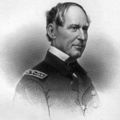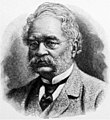Wikipedia:Selected anniversaries/April 29
This is a list of selected April 29 anniversaries that appear in the "On this day" section of the Main Page. To suggest a new item, in most cases, you can be bold and edit this page. Please read the selected anniversaries guidelines before making your edit. However, if your addition might be controversial or on a day that is or will soon be on the Main Page, please post your suggestion on the talk page instead.
Please note that the events listed on the Main Page are chosen based more on relative article quality and to maintain a mix of topics, not based solely on how important or significant their subjects are. Only four to five events are posted at a time and thus not everything that is "most important and significant" can be listed. In addition, an event is generally not posted this year if it is also the subject of the scheduled featured article or picture of the day.
To report an error when this appears on the Main Page, see Main Page errors. Please remember that this list defers to the supporting articles, so it is best to achieve consensus and make any necessary changes there first.
Images
Use only ONE image at a time
-
"The Old Gate", Tsinghua University
-
David Farragut
-
1991 Bangladesh cyclone
-
Ernst Werner von Siemens
-
Sir Francis Drake
-
Nancy Wake
Ineligible
| Blurb | Reason |
|---|---|
| International Dance Day | refimprove |
| 1587 – Anglo-Spanish War: In the Bay of Cádiz, Francis Drake led the first of several naval raids on the Spanish Armada that destroyed so many ships that Philip II of Spain had to delay his plans to invade England for over a year. | unreferenced section |
| 1882 – German inventor Werner von Siemens began operating his Elektromote, the world's first trolleybus, in a Berlin suburb. | refimprove sections |
| 1911 – Tsinghua University, one of the leading universities in mainland China, was founded, funded by an unexpected surplus in indemnities paid by the Qing Dynasty to the United States as a result of the Boxer Rebellion. | refimprove section |
| 1916 – First World War: Khalil Pasha of the Ottoman Army accepted the surrender of Major-General Charles Townshend and the British Mesopotamian Expeditionary Force, ending the Siege of Kut. | refimprove section |
| 1945 – Second World War: Allied forces began dropping food into parts of the occupied Netherlands, with the acquiescence of the occupying German forces, to feed people who were in danger of starvation due to the Dutch famine. | refimprove |
| 1946 – The International Military Tribunal for the Far East convened and indicted Hideki Tojo and 27 other Japanese leaders for war crimes. | unreferenced section |
| 1999 – Kosovo War: The Avala Tower on Avala mountain near Belgrade, Serbia, was destroyed by NATO bombardment in an attempt to put Radio Television of Serbia off the air. | refimprove |
Eligible
- 1862 – American Civil War: Union forces under David Farragut captured New Orleans, securing access into the Mississippi River.
- 1903 – A 30 million cubic-metre landslide buried the town of Frank, Northwest Territories, and killed at least 70 of the town's residents, making it the deadliest landslide in Canadian history.
- 1944 – Second World War: British agent Nancy Wake parachuted into Auvergne, becoming a liaison between the Special Operations Executive and the local Maquis group
- 1945 – The Holocaust: The Seventh U.S. Army liberated Dachau, the first Nazi concentration camp, and allegedly wounded and killed German prisoners of war.
- 1970 – Vietnam War: The South Vietnamese Army launched incursions into Cambodia to attack communist jungle bases.
- 1975 – Vietnam War: North Vietnam concluded its East Sea Campaign by capturing all of the Spratly Islands that were being held by South Vietnam.
- 1991 – A powerful tropical cyclone struck Chittagong, Bangladesh, killing at least 138,000 people and leaving as many as 10 million homeless across the region.
- 1997 – The 1993 Chemical Weapons Convention went into effect, outlawing the production, stockpiling and use of chemical weapons in those countries that ratified the arms control agreement.
- 2011 – A worldwide television audience of 300 million people watched the wedding of Prince William, Duke of Cambridge and Catherine Middleton at Westminster Abbey in London.
- Born/died this day: George Farquhar (d. 1707) · Harold Urey (b. 1893) ·
Notes
- Dachau concentration camp appears on March 22, so Dachau liberation reprisals should not appear in the same year
- Fall of Saigon/Operation Frequent Wind (1975) appears on April 30, so Cambodian Campaign and East Sea Campaign should not appear in the same year
April 29: Day of Remembrance for all Victims of Chemical Warfare; Pesach Sheni (Judaism, 2018)
- 1770 – British explorer James Cook and the crew of HMS Endeavour (replica pictured), the first European ship to land in eastern Australia, reached the coast of Botany Bay near present-day Sydney.
- 1910 – The Parliament of the United Kingdom passed the People's Budget, the first budget in British history with the expressed intent of redistributing wealth among the British public.
- 1968 – The controversial musical Hair, a product of the hippie counterculture and sexual revolution of the 1960s, opened at the Biltmore Theatre on Broadway, with its songs becoming anthems of the anti-Vietnam War movement.
- 1992 – The acquittal of policemen who had beaten African-American motorist Rodney King sparked six days of civil unrest in Los Angeles, during which 63 people were killed.
- 2015 – The ringleaders of the Bali Nine were executed in Indonesia for attempting to smuggle 8.3 kilograms (18 lb) of heroin to Australia.
Thomas Cooper (d. 1594) · Georgia Hopley (b. 1858) · Hendrik Nicolaas Werkman (b. 1882)







